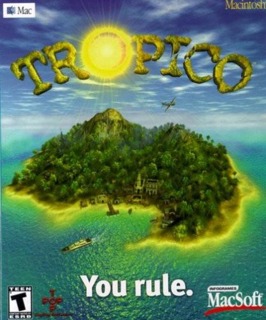Proving that you don't have to be a dictator to run a Caribbean island, Tropico is every budding Presidente's dream.
The premise of the game is that the "Republica de Tropico" is a small Caribbean island somewhere in the Gulf of Honduras of varying size and topography. And in this particular game, you get the chance to be the island's Presidente, starting in 1950 and usually running up until the present day. Your character can either be self-designed, or based on a real-life leader, such as Juan Peron, Augusto Pinochet and bizarrely, Jazz musician Lou Bega. Along with attempting to balance relations between the United States and the Soviet Union, you must also keep your citizens happy, by keeping them all employed, housed and entertained, as well as boosting your country's economy with lucrative industries or attractive tourist facilities, along with making sure you are squirreling away enough money to fund your retirement. You can rule with a fist of iron, corrupt the nation with your various philandering, or hold free democratic elections: the choice is yours. Each decision you make will have an impact on your citizens' perception of the success of your rule, and alter their respect for you.
On the whole, the tycoon aspects of this game are extremely well thought out. Each citizen in your populace has many identifying characteristics, such as along with the usual name, age and family, how good their standard of healthcare, happiness, and respect for you is, along with membership of any factions (such as Militarists, Environmentalists and Communists). Buildings must be constructed on flattened ground, which will be undertaken through the help of your construction workers, and products are transported to the dock by teamsters before being loaded onto ships by the dockhands. Appropriate military and police forces must be trained and enlisted, in order to keep the workforce under control. Farms or ranches must be kept to ensure a steady production of food, and churches constructed to keep the religious happy. All in all, there is enough micro-management to keep you satisfied, but not too much so you feel overwhelmed by how much there is to do.
Staying in power for extended periods can sometimes be challenging. Inevitably, any decision you make will have its detractors, and if their forces are big enough it could lead to civil revolt. Similarly, rigging the elections will result in a blow to citizens' liberty, also potentially prompting an uprising. Managing your international relationships with the United States and the USSR can also mean treading a very fine line. If you are extremely friendly with the Soviets, it could lead to a US trade embargo or regime change, and likewise being pals with the Yanks could precipitate a Soviet invasion of Tropico. All of these balancing acts are fun and good natured, and most of the letters you receive from international diplomats or concerned citizens are accompanied by amusing pieces of information provided by your Presidential aide.
You can also issue a number of official Presidential Edicts to assist with the running of the country, which will grant special benefits whilst they are enacted. A number of these can be relatively minor, such as doubling your citizen's food or introducing cleaner air acts, but others can have important implications. For example, if you decide to issue the Papal Visit edict, you'll gain huge popularity with the Religious faction, but your standing will suffer with others, since they will view it as favouritism. Further, if during an election you decide to have the opposition candidate assassinated or imprisoned, this will dent your liberty rating, but might also make you become more favourable to the Militarists (unless you assassinated a Militarist that is). Again, these management decisions are always interestingly presented, and hardly ever feel impossibly challenging.
Sound is brilliantly done across the board. The game features a great selection of classic Caribbean and Latin Jazz music, all of which gives off this nicely upbeat, lively atmosphere, so that you can almost imagine you are listening to the local radio station of your island nation. The character voices of your executive advisor (who sounds wonderfully like a friendly Cuban cigar maker), your various citizens and also the tourists who visit your island are wonderfully done: everything from the Miami tourist's smooth American drawl to the pleasant "Hola Presidente!" spoken by the island's children. General sound effects and ambient sound are also perfectly passable.
On the downside, Tropico doesn't have a sandbox editor, although it will let you select from a multiplicity of options concerning the setup of your scenario. Graphically the game isn't particularly impressive, but is on par something like with Railroad Tycoon II and other strategy games from that time. Occasionally however, some buildings can appear to be sitting strangely on the landscape from certain angles. Details can be ramped up quite a bit, and today even intermediate computers should be able to easily run the game on the higher settings. Frankly, they are perfectly adequate for what they game wishes to achieve. You could also become bored by the repetitive nature of many of the pre-designed scenarios, although usually there will have enough variety to keep you entertained. To conclude, Tropico remains as a gentle and fun island simulation, that is different enough from the dominating SimCity to have developed its own unique appreciation. With the news that Tropico 3 is on the way, there is no better time to play the original.

